“For every O’Dwyer, there is a Shaheed Udham Singh.” – Salman Rushdie, in his novel, Shalimar the Clown.
Shoojit Sircar’s film ‘Sardar Udham’, starring Vicky Kaushal as Udham Singh, traces the life of the famous revolutionary who avenged the horrific Jallianwala Bagh massacre. He shot dead Michael O’Dwyer, the former Lieutenant Governor of Punjab who was responsible for opening fire at the peaceful gathering of 20,000 protestors.
A man who ‘kissed the noose so that we may be free’, Udham Singh’s heroic deed is a part of the national folklore around India’s freedom struggle — he patiently planned it for over 20 years. He is also known for his legendary alias, Mohamed Singh Azad, but not much is known about the origin of this name.
Here are some anecdotes from history that may reveal why he had such fondness for this name.

Pages from India’s past reveal that Udham Singh was a champion of religious and class solidarity. During his trial for assassinating O’Dwyer, he gave his name as Mohammad Singh Azad, which was also tattooed on his arm, as a symbol that all religions in India were united in their opposition against British rule.
In March 1940, Singh wrote a letter to the investigating superintendent, asking that the authorities preserve his given name as ‘Mohamed Singh Azad’, even telling critics of his chosen epithet to “go to hell”. Having found out his identity and knowing the impact of such a symbolic name, the British Raj naturally did not oblige.
Apart from his signatures on political and prison correspondence, it is reported that years ago in 1931, Udham Singh had printed ‘Ram Mohamed Singh Azad’ on the signboard of his small shop in Amritsar.
Interestingly, in her book A Patient Assassin, journalist Anita Anandho argues that Singh may have been an atheist like Bhagat Singh whom he most idealised. The duo shared a deep friendship and had been imprisoned together in the 1920s.
Bhagat Singh’s impact on Singh can be gathered from a letter that the latter wrote on 30 March 1940. It stated:

“It is since 10 years when my friend [Bhagat Singh] has left me behind and I am sure after my death I will see him as he is waiting for me…it was 23rd [when they hanged Bhagat Singh] and I hope they will hang me on the same date as he was.”
That aside, most historians concur that Uddham Singh’s inclusive melange of an alias, especially the word ‘Azad’, emphasised a political ideal that he felt was crucial for India to achieve freedom — that of unity of all religious communities in the fight for ‘azaadi’ from British imperialism.
It was thus perhaps fitting that when his remains returned to India decades later in August 1974, the final rites were administered by a Hindu Pandit, a Muslim Maulvi and a Sikh Granthi. A part of his ashes were then dispersed at holy sites associated with each faith.
Read More here.
(Edited by Yoshita Rao)
No comments:
Post a Comment